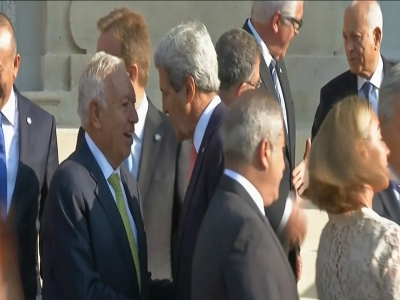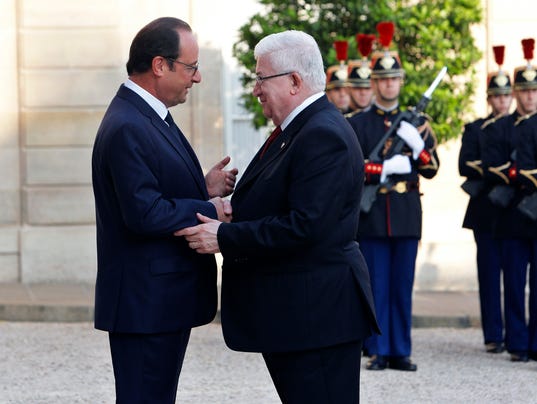'No time to lose' in global push against militants

PARIS (AP) — With reconnaissance planes already in action, France's
president said there was "no time to lose" in the global push to combat
extremists from the Islamic State group as he opened an international
conference to attack the problem — minus the two countries who share
most of Iraq's borders.
With memories of the 2003 U.S. invasion of
Iraq still fresh, the U.S. has so far been alone in carrying out
airstrikes and no country has offered ground troops. But French
reconnaissance jets made their first sorties on Monday, French officials
said. An American official said several Arab countries had offered to
conduct airstrikes. The officials spoke on condition of anonymity to
discuss the sensitive issues.
"The terrorist threat is global and
the response must be global," French President Francois Hollande said,
opening a diplomatic conference Monday intended to come up with an
international strategy against the group. "There is no time to lose."
Iraq's
President Fouad Massoum called for a coordinated military and
humanitarian approach, as well as regular strikes against territory in
the hands of the extremists and the elimination of their funding.
"There can be no sanctuary," Massoum said. "We have to dry up their sources of financing."
Muslim-majority
countries are considered vital to any operation to prevent the
militants from gaining more territory in Iraq and Syria. Western
officials have made clear they consider Syrian President Bashar Assad
part of the problem, and U.S. officials opposed France's attempt to
invite Iran.
Ahead of the conference, France's foreign minister
acknowledged that a number of the countries at the table Monday had
"very probably" financed Islamic State's advances, and Iraq's president
appeared ambivalent about Arab participation, saying his country needed
the support of its neighbors — but not necessarily their fighter jets or
soldiers.
"Ultimately, this is a fight within Islam, within Sunni
Islam," White House chief of staff Denis McDonough told Fox News on
Sunday.
The gathering itself was set to last just a few hours.
Hollande French Foreign Minister Laurent Fabius said quick action was
vital, insisting there was no comparison with the 2003 U.S. invasion of
Iraq, which France vocally opposed.
"It's the same geographic area
but that's the only similarity," Fabius told France Info radio on
Monday. "When you are a political leader you have to measure the cost of
inaction."
In an interview on Sunday with the Associated Press in
Paris, Massoum — a Kurd, whose role in the government is largely
ceremonial — expressed regret that Iran was not attending.
He also
seemed lukewarm to the possible participation Egypt, the United Arab
Emirates and Saudi Arabia in airstrikes in Iraqi territory.
"It is
not necessary that they participate in airstrikes; what is important is
that they participate in the decisions of this conference," he said,
underscoring Baghdad's closeness to Iran and how tensions among the
regional powers could complicate the process of forming a Sunni
alliance.
Gulf states, particularly Saudi Arabia and the United
Arab Emirates, have some of the region's best-equipped militaries, and
they could theoretically provide air support to a broader international
coalition. U.S. officials say the Emirates and Egypt were behind
airstrikes against Islamist-backed militants in Libya last month.
Speaking
in his first interview since becoming Iraqi prime minister, Haider
al-Abadi told state-run al-Iraqiyya in comments aired Sunday that he had
given approvals to France to use Iraqi airspace and said all such
authorizations would have to come from Baghdad.
The killing of
David Haines, a British aid worker held hostage by the militants, added
urgency to the calls for a coherent strategy against the brutal and
well-organized group, which is a magnet for Muslim extremists from all
over the world and rakes in more than $3 million a day from oil
smuggling, human trafficking, theft and extortion, according to U.S.
intelligence officials and private experts.
British Prime Minister
David Cameron said his country would continue offering logistical help
to U.S. forces and that counterterrorism efforts will increase,
describing the Islamic State group as a "massive" security threat that
cannot be ignored.

